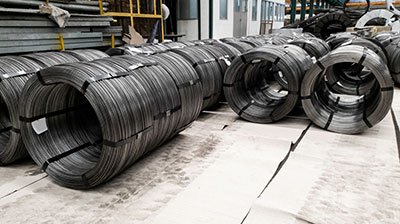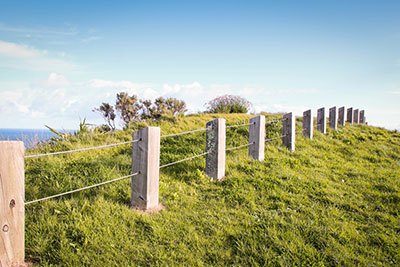Do you want to protect your outdoor space from intruders or keep livestock safe? Investing in a high-tensile wire may be the perfect option for you!
With numerous advantages compared to traditional fencings, such as affordability and strength, this type of fencing provides effective security for any area.
Discover what makes the high-tensile electric fence wire so valuable and find out why it is becoming increasingly popular with homeowners and farmers alike.
Take away key points:
- The high-tensile wire is an ideal tool for fencing as it provides advanced animal control
- It’s ideal for its durability, strength, PSI measurements, and other features, making it convenient to purchase
- Read our guidelines below to learn more benefits the wiring system provides
Table of Contents
- High-tensile wire for the advanced electric fencing
- FAQs
- Summary
High-tensile wire for the advanced electric fencing
If you need to know more about high-tensile wire, its role, and its benefits in electric fencing systems, refer to the information below. You will find all answers to your questions.
What is a high-tensile wire in electric fencing?

The high tensile wire is a type of electrified wire used in electric fencing. It is made from high-carbon steel with a carbon content of .28%, so it’s stronger and more durable than other types of wire fencing. This type of electrified wire has a breaking strength 1000 to 1500 lbs and can be used for pasture fencing, tying, or bundling.
What is the purpose of the electric high-tensile fence wire system?
The purpose of using electrified high-tensile wire for an electric fence is to create a secure barrier that can withstand harsh weather conditions while still providing excellent conductivity.
The electrified high-tensile wire is designed to be more durable than other types of fencing materials, meaning it will last longer and require less maintenance over time. Thus, it’s resistant to corrosion, and rust, and it’s strong enough to ensure external pressure, forces, and impacts. So, it offers a higher breaking strength.
Additionally, the use of this type of wire allows for greater flexibility in terms of design, allowing you to customize your fence according to your specific needs. The electrified fence wire provides an easy installation process to protect your livestock and property.
Is a high-tensile wire better than conventional barrier fences?
The electrified high-tensile wire is quickly becoming the preferred choice for fencing over conventional barrier fences such as barbed wire and woven wire fences. The electrified high-tensile wire offers several benefits that make it an attractive option for many consumers.
One of the biggest advantages of electrified high-tensile wire is its cost-effectiveness. It takes less than half the time to build compared to the traditional fence, making it a great option for those on a budget. Additionally, electrified high-tensile wire requires little maintenance and offers better control than conventional barrier fences.
The strength of high-tensile wire also makes it an ideal choice for many applications. Its higher psi rating gives it a higher breaking strength than a low-carbon fence. The fence wire can withstand more pressure without breaking or sagging. This makes the product perfect for containing livestock or other animals that may try to break through weaker wires.
Finally, high-tensile wire is also lighter and longer lasting than other types of wires. Thus, the product is an excellent choice for those looking for a durable solution that won’t need frequent replacement or repair.
Overall, high-tensile wire is an excellent choice for many applications due to its cost-effectiveness, strength, and durability. It’s easy to install and maintain, making it a great option for those looking for an economical yet reliable fencing solution. The high-tensile product is great for advanced livestock control.

Choosing the best high-tensile fence wire
Choosing the best high-tensile fence wire for your needs can be a daunting task. There are many factors to consider, such as: a gauge, tensile strength, coating, installation, breaking strength.
1. The fence line gauge
It’s 12.5 gauge, so the high tensile smooth wire is a popular choice for building, livestock, cattle, and pasture fencing, or tying due to its single-strand design. Electrified, high-tensile fences are much less cumbersome and laborious to install than barbed wire fences because the smooth wire does not snag or cut.
2. Tensile strength
The fence line also has a high tensile strength which ensures that there is no sagging afterward. When installing the fence, it should only be tensioned between 150 to 200 pounds to avoid over-tensioning the hi-tensile wire.
3. Coating
The high-tensile wire is made of high-carbon steel with a carbon content of .28%, so, the high-tensile fence wire is more durable and sturdier than other types of wires.
4. Easy to install
The high-tensile wire is a great choice for electric fence installation due to its strength and durability. It can be tensioned up to 200-250 pounds. Thus, it’s ideal to control livestock and cattle or keep out predators.
The installation process is relatively straightforward, with the use of a spinning jenny wire de-reeler or another similar device.
Additionally, you’ll need to attach guide wire and place posts to properly install the fence. Once installed, the high-tensile wire can provide an economical and long-lasting solution for your fencing needs.
5. Breaking strength of high-tensile wire
It has a very high breaking point of 1000 to 1500 pounds, and when galvanized, it can resist rust and corrosion. The 12.5 gauge high tensile electric fence has a breaking strength of 170,000 PSI. This makes it ideal for fencing jobs that require increased post spacing with greater strength and flexibility.
Tips to properly maintain the high-tensile electric fencing wire

The system requires proper maintenance to remain effective. Here are some tips for properly maintaining your system.
Don’t attach the wires too tightly to line posts – The line must be able to float past each line post to maintain the elasticity effect. This allows the high-tensile wire to absorb any shock from animals pushing against it.
Use 12.5 gauge galvanized high tensile wire – This type of wire is more resistant to corrosion and will last longer than other types.
Make sure the fence is properly stretched – Over time, the lines can become loose, so you’ll need to check them regularly and adjust as needed.
Use a low-impedance energizer with adequate joules – A low-impedance energizer will help ensure that your fence remains charged and keeps livestock safely contained within its boundaries.
Loosen the tension of the product when snow falls onto them – Heavy snow or ice can cause additional strain on your fence, so it’s important to loosen the tension of the lines to prevent damage or sagging.
Use 20,000-volt hookup wire for connecting from the fence terminal on the energizer – This type of hookup wire is designed specifically for electric fences and will provide better protection against voltage loss than other types of wiring.
Install proper brace assemblies – Properly installed brace assemblies can help reduce sagging and provide extra support for your fence during heavy weather conditions such as snow or ice storms.
By following these tips, you can ensure that your wire remains in good condition and continues to do its job effectively!
FAQs
Is high tensile wire good for an electric fence?
Yes, the wire is easy to install and use for permanent fencing systems.
What gauge wire for a high tensile fence?
You need a Class 3, 12.5 gauge with an advanced breaking strength of around 1350 pounds.
Is thicker wire better for an electric fence?
Yes, a thicker wire is better for electric fences as it has more resistance and can handle higher voltages. For most applications, 14 or 17-gauge wire is recommended depending on the length of the fence and what type of animal is being contained or repelled.
What is the best cable for an electric fence?
The best option of either a galvanized steel or aluminum wire.
What is the best post spacing for a high tensile fence?
The best post spacing is between 8 and 25 feet apart, depending on the fencing type and your area.
How to repair your high tensile fence?
Follow the steps below:
– Identify the problem area
– If you have a break in the wire, you can use Gripple Plus to re-join the wire together. If you need to splice the new wire into the break, Gripple Plus can also be used for this purpose.
– Use a fence stretcher to pull both sides of the fence taut again after making a splice or repair.
– Add a fencing sleeve at this point for extra reinforcement.
Summary
The electrified fencing wire is an ideal solution for multiple benefits: better control, more PSI, rust resistance, and other advantages. If you want to know more, purchase it today and find all the crucial information!
